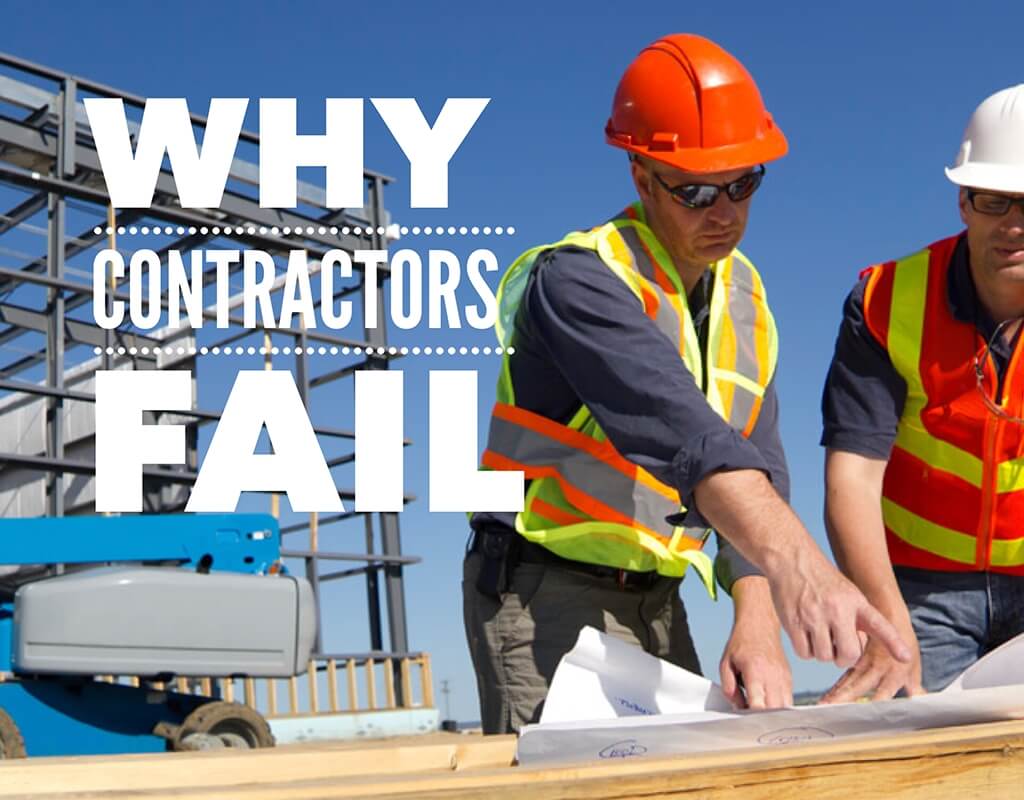
Businesses fail every day and construction firms are no exception. SBA statistics indicate that almost 50% of all small companies fail within five years. This is much worse in the construction industry where roughly 64% never see year five. The ingredients to failure are too many to call out in a simple article, but owners of small to medium construction firms must understand, combat, and manage the following five reasons. Understanding why it happens can help you not become a statistic.
Top 5 Reasons Construction Companies Fail
1. Lack of Basic Business Strategy
Most construction company owners are great at their trades and focus on the project at hand and the one on its way. We have all heard the old adage coined by John L. Beckley: “Most people don’t plan to fail. They fail to plan.” Owners must take the time to build a strategic plan and the tactical actions to implement it. This does not have to be a multi-volume document, but it does have to be something you can pick up and routinely use to monitor your progress. Every successful businessman/woman, athlete, musician, etc., sets goals and defines a path to get there. This also holds true for the construction business owner.
2. Poor Strategy Related to Growth
Every business starts with a person being really good at what they do. This is especially true in construction. If you are a good concrete guy or gal, stick to what you do well: concrete. Always be looking for ways to improve your core business, ways to be more efficient and cost-effective, and ways to diversify your client mix. However, be wary of venturing or expanding into uncharted waters because you see another way to make a quick buck.
If you do expand, plan the growth; create a budget and forecast, and know that growth takes cash. Be sure your current business and the new business will have sufficient cash flow to operate. After all, growing too fast can be just as damaging as growing too slowly.
3. Employee Issues
Every business says that “people are their greatest asset”. First, that is incorrect as the RIGHT people are the greatest asset. Author Jim Collins, in his book Good to Great, describes the need to get the right people “on the bus” and then move them “into the right seat”. There can be nothing more important to a construction firm than hiring and retaining the right people. You can be a great boss and hire bad people, or worse, hire great people and not be able to retain them. Turnover is a death knell for small firms. There are tons of resources on learning how to hire, lead, and manage people. Invest in yourself and the future of your firm by learning and practicing the right skills.
4. Reactive Bidding Strategy
Every job you chase is a hard bid, all-in price, and often made with limited specs or information. Inadequate bidding means low margins or worse – losing money. Low margins mean you live on the cash flow edge, never getting ahead. First, know what to bid and what not to bid. Resist the urge to bid on everything because you are afraid to miss out. Know in advance that you SHOULDN’T consider poorly-defined jobs.
Also, be vigilant of scope-creep and change orders. In every proposal, define the basis of your bid, what is included, and what is not. Specify the conditions and assumptions you made to bid on the job and then hold your ground when things change. Too many folks give in because they do not want to upset the customer. Before the creep occurs, communicate the concerns early and often with the GC and owner, and get signed change orders before moving forward. Sometimes you have to fire a client to protect your company.
5. Feast or Famine Workloads
All small businesses struggle with either having too much or not enough business. This is especially true for construction firms that are affected by the economy or by weather. Most business owners are good at their trade but not so good at business management. Often a family member is the back office financial support that might not be that financially educated. Before investing in that next piece of equipment, think about getting a financial manager or outsourcing a CEO to help you shore up the business. Budget your business based on the seasonal cash flow ebbs and flows and make allowances for those work-stopping rainy periods.
While there is no one thing that can stop construction companies from failing, carving away at common problems can help – put strong financial discipline into your business, have reserves in place to make payroll, and keep those “right people” employed when downtimes rear its ugly head.
Article Sources:
- SBA. “Frequently Asked Questions – March 2023, “https://advocacy.sba.gov/wp-content/uploads/2023/03/Frequently-Asked-Questions-About-Small-Business-March-2023-508c.pdf”
- Financially Simple. “12 Tips to Retain Valuable Employees, https://financiallysimple.com/tips-to-retain-employees/”

